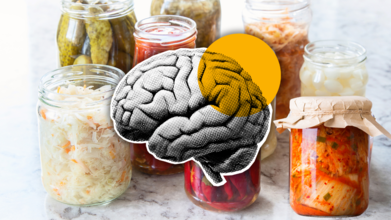- Health Conditions A-Z
- Health & Wellness
- Nutrition
- Fitness
- Health News
- Ayurveda
- Videos
- Medicine A-Z
- Parenting
- Web Stories
Nutritionist Reveals The Secret To Longevity: Why Add Years Of Healthspan Is Important Than Just Years Of Lifespan

Credits: iStock
When people talk about longevity, the conversation often stops at numbers, living into the 80s, 90s, or even reaching 100. But what if those extra decades are spent in sickness, weakness, or disability? Nutritionist Deepthi Devatha encourages us to reorient. "The more significant conversation is about healthspan," she explains. "It's the period of time when our bodies and minds are still vital, active contributors, not mere passengers on a ride of decline."
This change of mindset is changing how scientists, physicians, and people view aging. It's not a matter of living longer—it's about being more vital longer.
Longevity merely refers to the measurement of long life. Life expectancy in the U.S. has increased from 47 years in 1900 to 77.5 years in 2022. Medicine, sanitation, and technology advanced us to this point. Yet, though genetics contributes about 25% to lifespan, the other 75% depends on lifestyle: what we eat, how we exercise, and how we deal with stress.
That's why longevity is not so much years on the calendar as what those years are like. Living into the 90s is worth a great deal more if you can still exercise, travel, and dine with family without being burdened by chronic disease.
Healthspan vs Lifespan: What's The Difference?
While lifespan calculates the years we live from birth until death, healthspan calculates the years that we live in good health, without being affected by significant diseases or disabilities. The aim is to bridge the two.
In Australia, for example, the average healthspan is about 70 years, while life expectancy is 81.2 years for men and 85.3 years for women. That leaves a decade or more when many people struggle with chronic disease. For First Nations Australians, the gap is even starker, with average life expectancy nearly 10 years shorter due to historical inequities, discrimination, and limited access to healthcare.
This disparity shows why healthspan is significant. Piling on healthy years not only enhances quality of life—it takes a dent out of disease's societal and economic cost.
How Aging Works?
Declines in energy, physical activity, and the body's capacity to keep its systems in balance naturally come with aging. Researchers also examine the genetic mechanisms, such as DNA repair and telomere length maintenance, that affect how cells age. Genetics is not, however, destiny.
A new 20-year study discovered that embracing healthy behaviors, particularly in older age, can both enhance healthspan and life expectancy even in individuals who have a genetic inclination towards reduced lifespan. Lifestyle does not simply add years but colors the character of those years.
In Devatha's opinion, the largest error that people commit is believing that longevity is in costly pills or advanced anti-aging molecules. "The most powerful longevity tools we have aren't in a pill; they're on our plates and in our routines," she clarifies.
She cites food timing as a strong lever. Limiting meals to an 8–10 hour period may kick off the body's cellular housekeeping cycle, ridding it of junk and enhancing glucose control. While diets rich in highly colored fruits and vegetables, olive oil, legumes, and fish build a gut ecosystem that dampens inflammation and supports immunity. "Our gut is an invisible organ of immunity and mood control," she says.
What Role Diet Plays In Longetivity?
The silver lining is that aiding longevity does not need drastic diets. Plain, steady habits are ideal:
Muscle power in protein: 20–30 grams at each meal maintains muscle mass, an effective shield against age-related frailty.
Brain health from fatty fish: Consuming two servings of salmon, mackerel, or sardines weekly aids cognitive function.
Colorful plate: Berries, leafy greens, and spices such as turmeric provide antioxidants and anti-inflammatory effects.
As Devatha puts it, "It's not complicated plans or trends; it's about being clever with the food you take on a daily basis."
Why Movement, Mindset, and Balance is Important For Wellness?
Nutrition is the base, but it's most effective with other health behaviors. Physical fitness keeps muscles strong, the heart healthy, and the mind well. Managing stress—through exercise such as meditation, yoga, or even just emphasizing rest—will reduce the long-term stress on the body.
Social bonding is also an underrated aspect. Loneliness has been associated with reduced lifespan and decreased healthspan. Solid community bonding and fulfilling relationships make individuals more resistant, not just psychologically but physically as well.
The conversation around healthspan is gaining traction worldwide, partly because longer lives are straining healthcare systems. In the US, chronic diseases like diabetes, cardiovascular illness, and dementia often dominate the final decades of life. By focusing on prevention through diet, exercise, and lifestyle, societies can shift the narrative—from disease management to health maintenance.
It's not simply a matter of lasting long enough to have more birthdays. It's a matter of making those birthdays rich in mobility, independence, and joy.
The quest for longevity is individual, yet it is also profoundly social. If individuals prioritize extending their healthspan, the impact trickles down to benefit families, communities, and even economies. Healthy aging enables individuals to continue sharing their abilities, experience, and vitality with the world for a longer period of time.
And the transformations that drive this shift—eating whole foods, exercising every day, reducing stress, and staying engaged—are accessible to nearly everyone.
Longevity is no longer a matter of counting years—it's a matter of making years count. As Devatha underscores, "By taking charge of what you eat and how you move, you take charge of your well-being. It's the difference between just getting through the day and truly thriving."
Deepthi Devatha is a Nutritionist at Nutrify Today in India
Drink This on an Empty Stomach Every Morning for Faster Weight Loss and Better Digestion

(Credit-Canva)
Ever wondered if a simple change could make a big difference in your morning routine? While many of us reach for a cold glass of water or a hot cup of coffee, a medical expert is suggesting something else entirely: a warm cup of water. According to Dr. Kunal Sood, this seemingly small habit could be the key to kickstarting your day with surprising health benefits. It's an unusual but easy change that might just be worth trying.
Benefits of Warm Water
Dr. Sood points to three main reasons why starting your day with warm water on an empty stomach is a good idea. The first is that it can improve digestion. The theory is that warm water helps break down foods that your body might struggle with, making them easier to process. It may even help with constipation, as a 2016 study found that water heated to body temperature has a positive effect on bowel movements. This simple morning habit can help get your digestive system moving and prepare your body for the day ahead.
Aids Weight Loss
Another benefit of this simple habit is that it can help with weight loss. When you drink warm water, your body has to use energy to bring it down to your normal body temperature. This process gives your metabolism a slight, temporary boost. While it's a small change, that minor increase in your metabolic rate can help you burn a few extra calories over time. It's a simple, low-effort way to support your body's natural calorie-burning process, especially if you're trying to lose a little weight.
Boosts Blood Flow
Drinking warm water can also help improve your blood flow. The warmth causes your blood vessels to dilate, or widen. This widening effect allows blood to flow more easily throughout your body. Better circulation means oxygen and nutrients can be delivered more efficiently to your organs and muscles, which can make you feel more energized and ready to take on the day. It's a quick way to give your entire circulatory system a gentle and healthy boost.
What Happens When You Drink Cold Water?
Drinking cold water can actually make it harder for your body to do its job. It causes your blood vessels to shrink, which slows down digestion and makes it more difficult for your body to absorb water. Instead of focusing on getting nutrients from your food, your body has to work harder just to keep its temperature stable. This can cause you to lose water and feel less hydrated.
When you drink cold water right after eating, your body might create extra mucus. This could potentially weaken your immune system, making you more likely to catch a cold or other illnesses. For better digestion and hydration, it's often better to choose water at room temperature.
Some Precautions You Should Take Before Drinking Hot Water
Dr. Sood gives one final, very important piece of advice: make sure the water isn't too hot. It's crucial to be careful and check the temperature before you drink. You want the water to be comfortably warm, not scalding hot. Taking a moment to test it will prevent you from accidentally burning your mouth or throat. The goal is to make this a soothing, beneficial habit, not a painful one.
From Sauerkraut To Kombucha: How Fermented Foods Could Influence Neurotransmitters, Boost Mood And Reduce Anxiety

Credits: Health and me
Fermented foods have long been a staple across cultures for centuries, India's curd and pickles, sauerkraut of Europe, and kimchi of Korea. They are not only a matter of tradition and taste, but increasingly a solution to gut health, immunity, and wellness. Emerging science suggests they could quite possibly unlock improved mental health, influence neurotransmitters, and soothe anxiety and depression.
Fermentation is a natural process by which microorganisms such as yeast or bacteria break down complex food molecules. Not only is it self-preserving for foods, but it also enhances their nutritional content. As foods ferment, they release short-chain fatty acids that help digest food and nourish cells in the intestines. The process also makes the nutrients more accessible, producing B-vitamins, vitamin K2, bioactive peptides, and organic compounds like lactic and acetic acid. Enzymes developed during fermentation assist in the breakdown of carbohydrates, protein, and fat, and retard anti-nutrients such as phytates and oxalates facilitating mineral absorption such as iron, zinc, calcium, and magnesium.
Fermented foods typically contain live microbes, probiotics such as Lactobacillus and Bifidobacterium. Even if the microbes are killed, their waste, which are called postbiotics, retain the capacity to achieve health benefits.
The mantra "a healthy gut equals a healthy you" never rang more true. Fermented foods deliver beneficial bacteria that rebalance microbes, combat harmful microbes, and support digestion. Live-culture ferments provide metabolites in the form of short-chain fatty acids, bacteriocins, and organic acids that push out pathogens, lower gut pH, and promote good bacteria.
Fermentation also predigests carbohydrates and complex proteins, tenderizing food on the digestive tract. Enzymes in fermented milk help lactase-deficient individuals digest milk products easily. Additionally, the breakdown of antinutrients improves mineral absorption—a critical advantage over vegetarian diets.
How Fermented Foods Boosts Immunity?
A healthy immune system starts in the gut. By providing support for probiotic gut bacteria, fermented foods are able to modulate immune function, improve gut-barrier integrity, and cause regulatory T-cell responses that control inflammation. Yogurt, kefir, and fermented cereals stabilize intestinal flora, which can indirectly improve overall immunity and protect the body from infection.
What Is The Gut-Brain Axis?
Your gut and brain are in constant communication through what is known as the gut-brain axis. This "highway" connects the gut and central nervous system by nerves, hormones, and immune signals. A balanced gut microbiome can soothe inflammation, regulate neurotransmitter production, and influence mood and thought. An imbalanced gut, however, can contribute to depression, anxiety, and cognitive decline.
Research more and more points towards fermented foods to be the key players in this regard. Research in EMBO Molecular Medicine identified probiotic-rich fermented foods to reduce depression and anxiety. In a mice study, mice with probiotics from fermented foods showed less stress and anxiety-like behaviors. The mechanism is through modulation of neurotransmitters such as gamma-aminobutyric acid (GABA), which controls nerve activity in the amygdala area of the brain—the brain region responsible for fear and emotion.
How Fermented Foods Influence Neurotransmitters?
The gut microbiome has a direct influence on the production of neurotransmitters. Nearly 95% of the neurotransmitter serotonin, the "feel-good" one, is produced in the gut. The probiotics in fermented foods can influence serotonin and other neurotransmitters like dopamine and GABA, which have a direct influence on mood, anxiety, and sleep. In essence, what you eat can influence how you feel directly.
Benefits for Specific Health Conditions
Fermented foods are helpful in an array of conditions:
Gastrointestinal illnesses: Yogurt, kefir, and curd rice can restore intestinal balance with antibiotic therapy or occasional IBS.
Lactose intolerance: Cultured milk is more easily digested.
Mineral deficiency: Fermented legumes and cereals increase iron and zinc bioavailability.
Oral and vaginal health: Food containing lactobacillus might maintain healthy bacterial counts.
However, fermented foods must be eaten under careful circumstances: immunocompromised people, histamine intolerance, active SIBO, or hypertensive patients have to hold back on aged or high-sodium ferments. Pregnant women should opt for clean, pasteurized sources to play it safe.
Tips to Eat Fermented Foods Effectively To Reap Mental Health Rewards
For best mood-boosting effects of fermented foods, choose products with live and active cultures. Pasteurized products have zero live probiotics and therefore are less effective. Notably, fermented alcoholic beverages like beer or wine do not have the same probiotic effects.
Yogurt and Kefir: Both have Lactobacillus and Bifidobacterium, linked to reduced anxiety and depression.
Kimchi and Sauerkraut: Rich in lactic acid and prebiotic fibers to nourish beneficial bacteria.
Miso and Tempeh: Provide brain-benefiting probiotics and amino acids that assist with mental health.
Steer clear of excessive sodium and sugar, since excessive intake can disrupt gut microbiome balance and eliminate the benefits.
What Is Nutritional Psychiatry?
Nutritional psychiatry encourages paying attention to food's impact on mood. A convenient technique is a two-to-three-week trial period of a "clean" diet free from processed foods and sugar and tracking changes in body and mind. Gradual reintroduction of foods allows you to identify the foods that enhance or hamper your mood, showing the strong link between diet, gut microbiome, and mental health.
While fermented foods contain strong benefits, moderation is the key. Bloating, gas, or an upset stomach can happen in a few individuals if they overindulge. For most individuals, incorporating a variety of fermented foods in a total balanced diet is the best means to get both gut and brain reward.
Fermented foods are more than a culinary or cultural trend—potentially, they are a gateway between gut health, diet, and mental wellness. By affecting neurotransmitters, supporting gut microbiota, and enhancing nutrient absorption, fermented foods offer tangible value to mood regulation, anxiety alleviation, and overall health. Incorporating live-culture ferments like yogurt, kefir, kimchi, and miso into your daily regimen might be an easy yet potent way to improve both brain and body.
Like Drinking Milkshakes? Just One Is Enough Threat To Your Brain

Credits: Canva
Milkshakes may be a nostalgic treat, but new research warns they might be doing more harm than good to your brain. And no, we’re not just talking about the dreaded brain freeze.
A recent study published in The Journal of Nutritional Physiology found that just one high-fat milkshake can impair blood vessel function in a matter of hours. The results are a wake-up call about how quickly a single indulgent meal can impact both heart and brain health.
The “Brain Bomb” Experiment
Researchers tested two groups of men, 20 participants between ages 18 and 35, and 21 participants between ages 60 and 80. Each volunteer consumed what scientists described as a “high-fat milkshake.”
This wasn’t your average dessert order, the concoction was made with:
- 350 ml of heavy whipping cream
- 2 tablespoons of chocolate syrup
- 1 tablespoon of granulated sugar
- 1 tablespoon of instant non-fat dry milk
Each shake packed 1,362 calories, 48 grams of carbohydrates, and 9.5 grams of protein. The researchers even gave it a nickname, the “brain bomb.”
What Happened After Drinking the Shake
Before participants drank the shake, researchers measured their blood flow using ultrasound. They repeated the test four hours later, this time while the participants performed squats.
The results were striking: blood vessels showed a reduced ability to constrict and relax properly, a sign of impaired vascular function. This effect was seen in both younger and older participants, but was about 10% more pronounced in the older group.
The study authors noted that this kind of impairment could cause brief fluctuations in blood pressure — meaning too little or too much blood might reach the brain for short periods.
Why Blood Vessel Function Matters for the Brain
Healthy blood vessels are key for regulating blood pressure and ensuring a steady flow of oxygen to the brain. When they don’t work properly, the brain can experience short-lived episodes of poor blood flow. Over time, this can raise the risk of:
Stroke – caused by restricted or blocked blood flow
Cognitive decline – reduced oxygen supply can damage brain cells
Dementia – impaired blood circulation has been linked to vascular dementia
“Swings in blood pressure become harder to manage,” the researchers explained. “That can mean brief episodes of too little or too much blood reaching the brain. Over time, this increases the risk of developing conditions like stroke and dementia.”
Not Just About Long-Term Health
One of the key takeaways from this study is how immediate the effects were. The researchers emphasized that even a single high-fat meal, not just a long-term unhealthy diet, can have measurable consequences.
“Our study offers a timely reminder that diet doesn’t just shape our long-term health. It also affects our body and brain in real time. And as we’re learning, when it comes to protecting brain health, every meal may count,” the scientists wrote.
Should You Avoid Milkshakes Completely?
While this study sounds alarming, experts stress that the occasional indulgence is not necessarily harmful. The problem arises when high-fat, high-calorie meals become a regular part of the diet.
A single milkshake might not cause lasting damage, but repeated exposure to high-fat foods could keep blood vessels in a near-constant state of stress, increasing the risk of heart disease, stroke, and cognitive issues over time.
Think Before You Sip
This research highlights a critical point, our brain health is impacted by what we eat, meal by meal. That creamy milkshake might feel like comfort food, but it could be temporarily reducing blood flow to your brain within hours.
If you enjoy milkshakes, consider making lighter versions with lower-fat milk or plant-based alternatives, or save them for rare occasions rather than a frequent treat. Your brain, and your heart, may thank you for it.
© 2024 Bennett, Coleman & Company Limited

